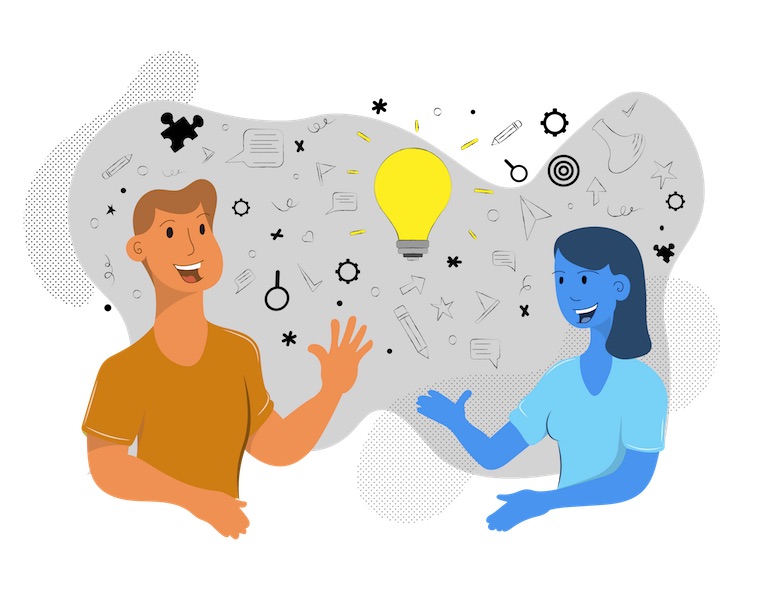Coaching
Coaching
Coaching
Coaching aims to produce optimal performance and improvement at work. It focuses on specific skills and goals, although it may also have an impact on an individual’s personal attributes such as social interaction or confidence.
Colleagues are to make use of coaching skills at the appropriate times during all their interactions with students and other colleagues. Whilst elements of a coaching style are included in the existing developmental provision the requisite skills are not collectively promoted as a valuable skillset for use in other contexts. It can be an effective tool for project delegation, problem-solving, helping someone to explore their career opportunities and performance management. Our current development opportunities are specified below, and we are developing application and awareness of coaching skills for everyone.
What is the difference between Coaching & Mentoring?

Coaching and mentoring are not the same thing. The approach, timescale and focus of a mentor and coach are different so it is important to understand these differences from the beginning, so you choose the most appropriate support for your needs.
A coach does not need to be familiar with the work you do or your workplace. Coaching is 'Unlocking a person’s potential to maximise their own performance. It is helping them to learn rather than teaching them.'
About coaching
Coaching is 'Unlocking a person’s potential to maximise their own performance. It is helping them to learn rather than teaching them.' (Whitmore)
Coaching is a confidential process which aims to help you discover how to address your challenges; develop greater self-awareness; identify goals and potential barriers; develop appropriate skills and strategies and feel empowered to take action. If you have management/leadership responsibilities, this may result in enhancing your ability to lead and communicate with others.
Coaching can help in these scenarios:
- Talented staff with potential can be developed ahead of time
- Support in improving skills, working relationships; managing conflict; dealing with underperformance
- Can generate ‘creative reflective space’ which fosters innovative thinking
- Can help build resilience of individual and their team
- Improve coachee's ability to relate to and influence others; to manage his/her time or how s/he comes across.
"13 myths about coaching" is useful for anyone considering coaching support and explains why coaching is not the right solution for everyone all of the time.
Coaching and Mentoring - Quality Conversations
Successful mentoring and coaching conversations engage people by challenging them to think, act and learn for themselves. This course will encourage you to develop the skills and techniques to enable quality conversation when coaching or mentoring. We will explore situations and models that can be applied in the workplace. Follow this link to book on to the Coaching and Mentoring - Quality Conversations course.
Notion Star Coach
Develop your coaching skills further with Notion Star Coach. All learners on the Notion STAR® Coach Programme will be given access to the online content so they can work through the programme at their own pace. Learners will have continued access to the online content for the full 12 week period and can repeat modules as many times as they like, and also continue to attend the Live Learning Stations even after they have completed the formal aspects of the programme to consolidate their learning.
Coaching Techniques for Academia
We are currently developing an online resource and face to face session for developing your coaching techniques. For more information please contact People Development.
Coaching Conversations (4 weeks x 2-3 hours per week)
About this course: Throughout the Coaching Skills for Managers specialization, we’ve discussed many topics for improving coaching conversations with our employees. It is now time to put all of that theory and discussion into practice and examine great examples of common coaching conversations!
Note: This course builds on all previous courses in the Coaching Skills for Managers specialization. It is highly recommended that students complete or be familiar with the topics covered in those courses before taking this course. In particular, you should be familiar with the coaching strategies and tools discussed in previous courses (such as the 5 whys technique, resisting what is, among others), and should have a full understanding of the Thought model and the various components of it: circumstances, thoughts, feelings, actions, and results.
Leadership Coaching Through Turbulent Times- Playing with eFIRE (3 weeks x 3 hours per week)
About this course: In today’s complex and uncertain world, how can you use coaching and mentoring to untangle messy problems and find solutions that will help you – and your staff – to survive as well as thrive? What strategies can help you to enhance the potentials and overcome the pitfalls of the leader-as-coach?This online course will show you how to apply eFIRE, a unique coaching model, to increase your impact as a leader, reflect on your experiences and receive peer feedback. You’ll explore a variety of coaching cultures through vignettes and the lens of leaders who are experiencing challenges with staff.
People Development maintain a register of approved coaches who have been vetted, are suitably accredited, with excellent references. We provide a brokerage service to help individuals source the most suitable external coach.
The costs of the coach are usually paid by the Faculty or Service and we assume that manager's permission has been gained, as meetings usually (but not always) take place during working hours.
To request an external coach please complete the External Coaching Application Form and talk to your HR Business Partner in the first instance; they will be able to help you formulate your application including any financial requirements.
This is then passed to People Development and a member of the People Development team will contact you to establish:
- whether coaching is the best method to achieve your goal
- your coaching needs and which of our coaches might be best suited to help you
People Development will then introduce you to a coach for a "chemistry session" to make sure the match is going to work. Once agreed your coaching can start.
At the end of your coaching period you will be asked to provide feedback on what you have gained from the expeirence and progress to meet your stated objectives.
If you are leading a significant project at the university and are wondering how you might best support project members, you may want to consider whether coaching key individuals or a specific team might be helpful. The first step is to contact Rachel Brewer in People Development to discuss your requirements.
Coaching Conversations
- The Will and the Skill: A Coaching and Mentoring Exercise
- Before selecting an appropriate coaching style, a coach must first establish their coachee’s level of skill and will. This exercise will help coaches develop their ability to accurately determine the coaching style best suited to a coachee’s needs
- The GROW Model
- The GROW model is a simple yet effective technique that can help coaches plan and structure their coaching conversations.
- Top Tips to Coaching
- These top tips will help you to conduct a coaching relationship effectively.
Use these assessments to consider how effective you are as a coach/mentor, and identify any areas for development:
LinkedIn Learning
Here are some FREE resources on LinkedIn Learning.
Internal Coaching Scheme
Our scheme uses qualified Coaches from academic and professional services roles across the University. The Internal Coaching Scheme is free and available to all staff across the university.
Internal coaching aims to produce optimal performance and improvement at work by supporting our leaders, managers and employees. It focuses on specific skills and goals, but also has an impact on an individual’s personal attributes such as social interaction and confidence. Coaching is about giving choice and responsibility to others, rather than giving them advice.
One of the best investments you can make is to embrace coaching skills for leaders and managers. A coaching culture increases employee engagement and productivity, helps to retain key employees, and improves the overall performance of your team.
Internal Coaching Session (All Staff)
We offer an initial chemistry session, available to all staff, depending on the needs of the coachee and the availability of the coach, the coach will discuss how many full coaching sessions may be best with the coachee. Some examples of situations/issues/concerns where coaching has been successful are:
- Helping people develop better interpersonal skills.
- Developing a more strategic perspective after a promotion to a more senior role.
- Handling conflict situations so that they are resolved effectively.
- Dealing with the impact of change on an individual's role.
- Working through an issue or challenge.
- Performance improvement and skills development.
- Personal growth, learning and development – including leadership development.
- Change in terms of increasing self-insight, making choices, taking actions, innovating and being creative.
- Career development or handling changes effectively.
- Support, health and wellbeing, building resilience and increasing confidence.
- Team development and culture change.
Booking Instructions
1. Please email internalcoaching@exeter.ac.uk to express your interest in securing a coaching session. If you have a specific preference to a particular Coach (see Coach Bios here) please state this in the email. We cannot however guarantee a specific Coach as they may already be at capacity with coachees, so if you are happy to see any Coach please also specify this within your email.
2. People Development will allocate you a coach and then send an email to you (and the coach) with introductions, instructions and some preliminary questions to consider before your first meeting. We then ask that together you both find a mutually beneficial date/time for the session/s. PLEASE ENSURE you cc.internalcoaching@exeter.ac.uk to the calendar appointment for all your coaching sessions to ensure we have a record of the appointments taking place and can follow up when necessary. (Please note we do not need to be cc'd. into all emails between coach/coachee for confidentiality reasons - just the appointments booked).
It is the responsibility of the coachee staff member to send the responses to the preliminary questions in confidence to the Coach ahead of the scheduled first session.
3. Your first session you arrange with your Coach should be an Initial Chemistry Coaching Session of 45mins (this session is shorter and acts as an initial introduction between you and your coach, to check you are both happy to work together and explore how you may work together on the topic you would like coaching on.) If you are booking any follow on sessions with your Coach you may request a longer 1 hour session. It is for you and your Coach to discuss and decide how many sessions will be required.
4. We ask both Coach and coachee to let us know once you have ended your series of coaching sessions via internalcoaching@exeter.ac.uk. We will then issue an initial evaluation form to you. We ask that you provide feedback so we can see the impact of the service and also to allow feedback to go to our Coaches.
5. We may also approach you a few months after your coaching sessions end to evaluate longer term impact and would ask for your cooperation with this; again to support our ability to understand the impact coaching has on our staff within the University of Exeter.
LEADERSHIP DIFFERENCE PARTICPANTS
For staff accessing coaching as part of their Leadership Difference Programme, please state this in your email to the allocated Coach. This offers the Coach the opportunity to discuss with you if you wish to bypass the initial chemistry session and proceed to a full session.
Our trained Coaches have all completed the Notion Accredited Internal Coaching (AIC) qualification. They work in a range of roles across the University and have a wide range of experience. They:
- Are able to deliver developmental coaching sessions.
- Understand and can apply a range of coaching and leadership development tools.
- Role model on-the-job and ‘in the moment’ coaching techniques as a method of engaging with and inviting from others a higher level of contribution.
- Understand how to manage confidentiality in a coaching relationship and how to manage any reporting and 3-way relationships without compromising or breaching any confidentiality.
- Recognise when it is appropriate to coach or use another leadership style.
- Abide by the Association of Coaching, coaching code of ethics.
Meet our Accredited Internal Coaches
Joanna Abraham
Jo has 15 years of industry experience in a range of roles across a variety of industries, plus over a decade in higher education (the UK and southeast Asia). Prior coaching experience includes the University of Bath “Women in Business” programme for new start-ups. As well as leading teaching and assessment on MSc and UG programmes, other coaching-linked activities include the university One Step Beyond mentoring programme, students on work experience, and developing skills and processes for employability as part of teaching and personal tutoring. She was the 2018 Winner of the University of Exeter Teaching Awards - Most Supportive Personal Tutor. She is the first Exeter academic to gain Internal Coach accreditation (Sept 2020).
Her interests lie in a range of coaching opportunities, from performance management and career development to personal exploration, skills progression, and navigating transition and behavioural change. She can employ a number of tools to support your coaching needs: intuitive and/or logical diagnostic processes, introspective questions, gentle unravelling and translation into tangible, recognisable and workable facts. These offer time and space to reflect, think, clarify, and consider options, and to encourage the confidence to take responsibility for desired future outcomes. Jo’s breadth of career experience provides coaching with context-awareness and empathy. As a former accountant/business consultant, logical problem decomposition and a practical approach to clarity and conclusion is second nature.
Alex Huke
Alex has over 25 years’ experience working at the heart of science, environment, innovation, economic and regional development. He’s worked for a wide range of public, private and voluntary sectors businesses and organisations both in the southwest and internationally and has worked both in research and professional services roles within the University. Alex currently leads the Environment and Clean Growth Team within Innovation, Impact and Business (IIB): a team that is responsible for managing several of the University’s key strategic external partners (i.e. the National Trust, Natural England, Met Office, South West Water, Shell), leads several million pounds of collaborative research and project activity and drives positive environmental and social outcomes from the University’s research.
Alex has completed Notion Limited: STAR® Coach Practitioner, STAR® Manager and Practitioner – Upgrade and Accredited Internal Coach courses. He is also a qualified PRINCE2 Practitioner and has been an accredited internal coach within the University for over 2 years. Alex uses informal and formal coaching practices in his line management and the development of his direct team. He also uses coaching principles as part of partnership and project development activities. Alex has found the ‘coaching approach’ as empowering way to unlock the ‘hidden ideas within.’ This is extremely empowering when working closely with a number of highly qualified academic leaders. Alex’s coaching style is still developing and evolving. He’d like to think he offers a friendly and informal approach that can help identify new, alternative and innovative perspectives. Alex feels his broad perspective gives clarity and focus on milestones and intermediate successes whilst crucially not losing sight of the bigger picture.
Rachel Brewer
Rachel conducts coaching sessions with professional services and academic colleagues to support a wide range of leadership/management development goals. She has facilitated numerous coaching sessions using 360-degree feedback reports, as a starting point for development conversations and planning. Rachel co-designed and delivers the university’s ‘Coaching & Mentoring: Quality Conversations’ course for staff.
Coaching qualifications: STAR® Coach Practitioner; STAR® Manager & Practitioner; Accredited Internal Coach Programme, including formally supervised and assessed coaching sessions (Notion Business Coaching, 2020-2021). Coaching Skills for Managers: Advanced Award in Coaching (Techniques for Change, 2013).
Rachel uses an enquiry-led approach to help coachees dig deep into the detail of the areas they want to develop. She uses varying timeframes within the conversation – encouraging coachees to undertake some reflection on the present and visioning for the future, whilst also exploring past experiences that may help with the achievement of their goals and aspirations. To quote an assessor from her most recent coaching programme: “You have a nice natural, friendly style, but also gravitas, somehow, gentle but firm!” Rachel’s aim is that you’ll leave the session with a strong sense of clarity and commitment that will move you towards your goal… but that it will also be a pleasant and insightful experience in getting you to that point! Rachel believes that we all have untapped potential and enjoys using the time and space that coaching provides to help coachees tap into that.
Fiona Kugele

Fiona has 20 years of experience working in higher education, predominantly in strategic planning but with experience in scientific research, student employability and faculty support roles bringing her a broad perspective on working in the HE environment. Fiona believes coaching can be a powerful tool to support wellbeing, collaboration, innovation and creativity. She is the coaching and mentoring lead for the Exeter Professional Group and has a strong interest in developing these activities further to support the personal and professional development of all staff and students.
Fiona has informally coached and mentored direct reports for a number of years as well as being a mentor to colleagues within the University. She is a volunteer mentor for the Inspiring Girls programme which aims to raise aspirations and broaden the horizons of schoolgirls in the Exeter area in relation to employment opportunities. Coaching qualifications include the STAR® Coach Practitioner; STAR® Manager & Practitioner and the Accredited Internal Coach Certification, including formally supervised and assessed coaching sessions.
Fiona aims to take a relaxed, holistic approach recognising the inter-connectedness of our personal and professional lives. Fiona will work with you to develop a trusted relationship encouraging self-awareness in order to become more empowered, effective and confident. Self-awareness is the start of being able to recognise and challenge the stories we are telling ourselves and the assumptions we make which may hold us back from achieving our goals.
Julia Frost

Background & Personal Information
Julia has 20 years experience of working in research and education. She has held research grants from a range of funders (ESRC, NIHR and MRC), published 50+ papers in peer-reviewed research journals, and taught across a variety of undergraduate and postgraduate programmes using research informed inquiry led learning. She previously worked in the NHS.
Julia has completed the STAR® Manager and Practitioner Programmes (Level 3&4) and STAR® Accredited Internal Coach Programme (Level 5); which included formally supervised and assessed coaching sessions
Coaching Experience
Julia is experienced at working with early career researchers to enable them to take the next steps in their professional and personal development, but looking for opportunities to coach a wider range of staff.
Coaching Style
Julia uses her enquiry-led approach to help coachees focus on areas that they want to develop; she uses a variety of tools through her coaching practice.
Case Studies / Testimonials
A recent coachee observed that the coaching provided by Julia enabled them to move successfully forward in their career development. An assessor from her most recent coaching programme noted how she supported her coachee in committing to a next step, and demonstrated her self-reflective capacity. As Julia is gaining experience along her coaching journey, she views reflection and feedback as key to developing her practice.
Locations
Exeter area, online.
Dr Caitlin Kight
_Resized_v1.jpg)
Caitlin has been affiliated with the University of Exeter since 2009 – first as a visiting researcher while completing her PhD, then as a postdoc, an education lead in the College of Life and Environmental Sciences, and then in the Communications and Marketing Services team; Caitlin joined what is now called Academic Development & Skills (AD&S) in 2017.
Originally a behavioural ecologist, Caitlin undertook a BSc and MSc in Biology, and a PhD in Applied Science. Even as a researcher, Caitlin was passionate about education, which is what inspired to her to become an academic developer. To support that transition, Caitlin undertook a PCAP (2018) and achieved recognition as a Fellow of the Higher Education Academy (HEA) and later as a Senior Fellow. Caitlin is currently pursuing an EdD (on self-study) in the Graduate School of Education.
Coaching Experience & Style
Caitlin came to coaching through leading on doctoral supervision practice, which blends techniques like mentoring, coaching, tutoring, and managing. Caitlin also coaches within her role as a Dignity and Respect advisor, manager, and through informal conversations with the staff and students.
Caitlin has completed the STAR® Coach Practitioner, Manager & Practitioner, and Accredited Internal Coach (AIC®) training programmes, as well as a specialist course on coaching using the Japanese concept of ikigai.
Case studies
Caitlin often provides coaching associated with specific professional and academic skills and has received particularly positive feedback on the following types of support:
• Improving confidence with communication
• Practicing mindfulness to achieve a healthier work-life balance
• Developing a personal reflective practice
• Engaging in an exploration of identity and self
• Reducing social anxiety during interpersonal interactions
Locations
Caitlin can provide virtual coaching across all of the University’s campuses, and face-to-face coaching at the Streatham and St Luke’s campuses.
Jane Stephenson

Background & Personal Information
HR and OD professional with a significant track record in delivering service transformation and motivating high performing teams. Innovative, caring and resilient professional who thrives on new challenges and the opportunity to make a difference. Have worked in the public, private and third sector
- ILM5 Operational Coaching and Management Practitioner
- Fellow of the Chartered Institute of Personnel and Development (CIPD)
- BA Business Administration (Economics and Industrial Relations)
I am personally interested in lifelong learning. I enjoy art, and use art to offset the pressures of daily life, and I also love walking in the great outdoors.
Coaching Experience
As a Senior HR Business Partner coaching forms part of my day to day practice. As a coach my role is to find a safe space to explore opportunities and solutions to tricky problems. During each coaching session, any decisions taken are absolutely owned by the coachee, but if I have helped to create a space to explore thoughts and ideas, then I hope to have made a difference.
Coaching Style
Naturally supportive and nurturing. All coaching conversations are strictly confidential. I create a non-judgemental safe place to explore ideas however weird and wonderful they might be. I will encourage you to reflect on your past actions, unlock new ideas, and help you to find solutions which you think are achievable.
Dr Sarah Cole

Sarah has over 25 years’ experience working in the field of education and currently teaches Education leadership and Management and holds the role of Senior Academic Tutor in the School of Education. Sarah has worked in a broad range of contexts and at the intersection of education and charity/ community based organisations working on the recovery from, and prevention of, domestic and sexual violence, utilising a coaching approach in her work. Her research focuses on Gender-Based Violence in Education.
Coaching Experience
Sarah is currently working towards accreditation with the International Coach Federation (ICF) ACC Level. She holds an Associate Coaching Diploma - Level 1 (ICF) & AACT (AC), PG cert in Positive Psychology Coaching (Distinction) and is a STAR® Coach Practitioner.
Coaching Style
Grounded in positive psychology, Sarah integrates personal and professional realms to nurture self-awareness, wellbeing, and empowerment. Through evidence-based practices, she fosters authenticity, respect, and collaboration in her coaching approach. She will work with you to identify and overcome barriers and cultivate newfound confidence and effectiveness in pursuing your aspirations. Sarah's coaching philosophy is free of judgment and she guides sessions with gentle, person-centred techniques, facilitating natural self-discovery. Through active listening and genuine empathy, Sarah creates a space where you feel heard and valued to explore your path forward, fostering wellbeing and igniting creativity along the way!
Types of support:
- Health and wellbeing, building resilience and increasing confidence.
- Transitions–career, role, grief, loss, relationships.
- Personal growth, learning and development – including leadership development.
Benefits to employees
- Improved confidence, performance and productivity.
- Supports staff development.
- A sense of continual improvement and progression.
- Improves working relationships.
- Fosters a constructive relationship with their manager and positive workplace culture.
- Enables staff to have more creative ideas.
- Motivates staff.
- Introduces a coaching culture.
Benefits to the University
- Internal coaching is far less expensive than hiring external coaches.
- The University can achieve more leverage by developing internal coaches than through any other activity or investment.
- Our internal coaches can support the continual development of skills that will benefit the University in real-time and can be applied every day as new opportunities and challenges arise.
- Internal coaches have much more in-depth knowledge of the University and its culture, they are able to work more quickly because they know what resources are available.
- Internal coaching is compatible with the ethos of a learning organisation.
- Coaching improves working relationships between managers and direct reports.
- Coaching develops and fosters more productive teams.
- Coaching uses University resources more effectively.
- Our coaches are role models for other managers.
- Coaching delivers increased efficiencies and goal achievement, leading to a more robust, high-performance culture.
Benefits for Coaches
- Managers that practice effective coaching techniques typically find the practice rewarding.
- Coaches take pride in watching team members grow and respond.
- Coaching improves individual and team performance.
- Coaching leads to improved motivation and productivity of our coaches.
- Coaches have more time for essential management and leadership activities as they have the necessary information to be able to delegate successfully.
- Coaches have a more constructive relationship with employees, they also have a greater understanding of skill levels, capabilities, and attitude.
- Coaching improves personal leadership skills and gives coaches valuable experience to further develop their personal coaching skills.
Coaching Agreement Between The Coach And The Coachee
The Coaching (which is not advice, consultancy, teaching, therapy or counselling) may address specific business and personal projects and is always based on the Coachee’s agenda.
The Coach agrees to:
- Undertake the coaching in the strictest of confidence.
- Be empathic, trustworthy, focused and non-judgemental.
- Actively listen to the Coachee, giving them their undivided attention.
- Provide honest and straightforward questions, requests, observations and feedback.
- Reflect in a way that helps the Coachee gain clarity.
- Encourage the Coachee to rise to challenges, overcome obstacles and take action.
- Remain impartial - advising and discussing any conflicts of interest.
The Coachee agrees to:
- Be motivated and committed to the process.
- Contribute to conversations openly and honestly.
- Come to a coaching session with some idea of what they want to focus on.
- Communicate to the Coach and take action if at any time the Coachee believes that the coaching relationship is not working as desired.
- Respect the Coaches time by meeting with, or speaking to, the Coach at the agreed date and time.
- Set goals and take action.
- Take full responsibility for all decisions and actions taken throughout the coaching relationship.
THE SMALL PRINT
Rescheduled appointments and Planned Holidays
The Coach will endeavour to meet the needs of the Coachee with rescheduled appointments providing that sufficient notice has been given. In addition, it is recognised that both the Coachee and the Coach will have holidays and other commitments that will need to be worked around. Both parties agree to a level of flexibility to cover these occasions.
Liability
The Coach will work to the highest professional standards to support the Coachee's decision making. All decisions and actions undertaken by the Coachee are the sole responsibility of the Coachee. Your liability as a coach will be the responsibility of the University as the employer, the coachee’s liability will similarly be the responsibility of the University.
Confidentiality and Legal Issues
Please note that any information which you disclose to the Coach will be treated sensitively and in full confidence where possible. All information will also be treated in accordance with applicable laws, such as the Data Protection Act 2018 and the UK GDPR. Such information, however, is not protected by any legal duties of confidentiality or privilege and may be open to disclosure to third parties, for example via legal proceedings, a subject access request or a Freedom of Information Act request.
Please also be aware that any information you pass to the Coach which may be considered to breach any applicable laws, your employment contract or acceptable conduct may be passed without your consent to your line manager and/or Human Resources. If such information indicates that a crime has been committed or may be committed in the future the University may pass such information on to the police or other relevant public authority.
If you are interested in becoming a coach, the first step is to complete the Notion Star Coach course. Learners will be offered the opportunity to progress onto the Notion Star Manager Practitioner and subsequently the Certified Master Coach. Please note frequency and places are dependent on funding and require an application process.
Why become a coach?
- Coaching is rewarding and fulfilling, and you will work with positive people who are eager to learn and achieve.
- With hybrid working, you can coach from anywhere with an internet connection.
- Geographical boundaries become irrelevant as you can have a face-to-face session across Teams.
- Expand your professional network and community. You will get to meet more people and instantly expand your network by having collaborative interactions.
- Coaching makes a real difference in people’s lives. You will be helping others improve the quality of their lives and achieve their goals.
- Coaching is enjoyable and invigorates both parties. Thanks to synergy, coaching creates energy and becomes even more joyful.
- Developing your coaching skills will help you take your personal and professional development to the next level. You may develop a local, regional, and national reputation.
Click here to find out more and start your coaching journey.
Course Overview
STAR® Coach Practitioner
STAR® Coach Practitioner consists of 10 online interactive modules delivered over 12 weeks (3 months). The programme is supported by an optional Live Tutor Session run every 2 weeks. A level 3 award in star operational coaching is awarded on completion. Learners will have continued access to the online content for the full 12-week period and can repeat modules as many times as they like, and also continue to attend the Live Learning Stations even after they have completed the formal aspects of the programme to consolidate their learning. We are inviting applications from Academic Leads and HoDs, PS Heads/Assistant Heads of Department or those with substantial line management responsibility and large portfolios. Staff will be expected to utilise their new skills in their workplace on completion.
STAR® Manager Practitioner
STAR® Manager Practitioner consists of 22 online interactive modules plus two 90-minute Tutor sessions. This takes 3-6 months to complete. Attendees can attend an optional Live Tutor Session run every 2 weeks. Completion leads to the level 5 certificate in star operational coaching and management practitioner. It is designed for all leaders and managers, to develop great people and to maximise their potential for long-term, sustained performance improvement.
Accredited Internal Coach (AIC)
On successful completion of the STAR® Manager Practitioner programme, you can progress to the Accredited Internal Coach (AIC®) programme. It comprises of 4 x half-day remote workshops, 3 group sessions and online activity. It takes 3- 6 months to complete all workshops, remote sessions, online activities, written work, reflective writing, your coaching biography and a final assessed Tutor session. On completion, coaches are awarded the Accredited Internal Coach Certificate and can upgrade to gain the ILM level 7 certificate for executive and senior-level coaches and mentors. The AIC combines the ILM7 Qualification in Executive Coaching and Mentoring with a pragmatic approach, minimising unnecessary academic study, and onerous paperwork, leaving you a highly skilled internal coach ready and able to undertake formal coaching assignments. On completion, staff will be signed up as coaches on our internal coaching scheme.
Right to request training
The University has arrangements in place for employees to submit requests for training. Ideally, requests for training should be discussed as part of your Performance and Development Review (PDR), as part of your induction for new staff, and at any other time during the year when you take on new roles and projects. It is not necessary for all requests for training to be submitted under the statutory procedure. Please discuss the training opportunity, and commitment, with your line manager before applying to become a coach.
The University support our Accredited Internal Coaches by providing them with supervision and opportunities for coaching Continuous Professional Development (CPD).
Details of our Coach CPD programme will be communicated directly to our coaches. Support includes group supervision, CPD sessions, and 1:1 coach support sessions.
What is Supervision?
Coaching supervision is a formal and protected time for facilitating a coach’s in-depth reflection on their practice with a Coaching Supervisor. Supervision offers a confidential framework within a collaborative working relationship in which the practice, tasks, process and challenges of the coaching work can be explored. The primary aim of supervision is to enable the coach to gain ethical competency, confidence and creativity so as to ensure the best possible service to the coaching client, both coachees and coaching sponsors. Supervision is not a ‘policing’ role, but rather a trusting and collegial professional relationship.
The purpose of the supervision sessions is:
- Supervision of their practice in the normative, formative, restorative and generative way.
- An opportunity to try out new tools, techniques, models and methodologies in a safe, developmental space.
- Time to reflect on themes across their practices and/or the profession or Institution.
What is continuous professional development (CPD)?
Ongoing Professional Development is training in skills that contribute to an individual’s professional development (e.g. personal development, coaching tools, ongoing coach training, or assessments, practice building, or other material that falls outside Coaching Competencies).



